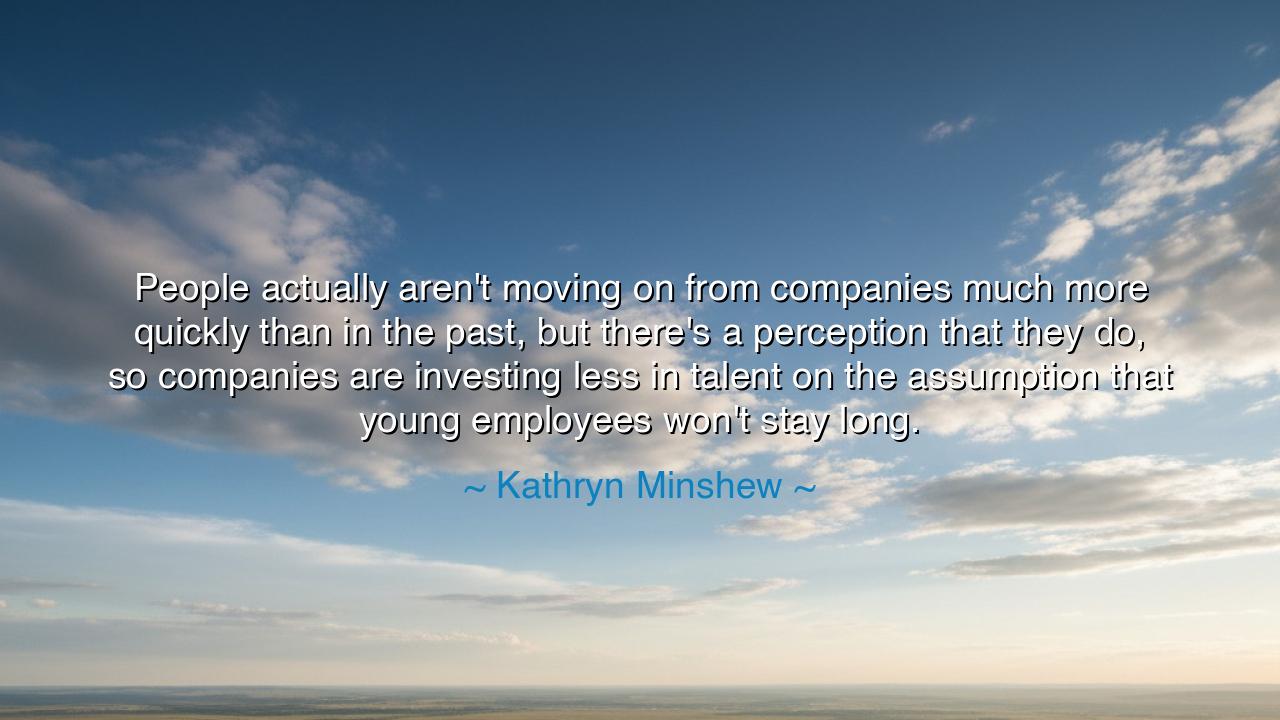
People actually aren't moving on from companies much more
People actually aren't moving on from companies much more quickly than in the past, but there's a perception that they do, so companies are investing less in talent on the assumption that young employees won't stay long.






In the words of Kathryn Minshew, founder and visionary, we are given a warning about the dangers of false belief: “People actually aren't moving on from companies much more quickly than in the past, but there's a perception that they do, so companies are investing less in talent on the assumption that young employees won't stay long.” This is not simply a commentary on the modern workplace, but a lesson in how perception can shape reality, and how fear, when mistaken for truth, can impoverish both institutions and individuals.
The heart of this saying is the recognition of a gap between truth and perception. Young employees are not leaving at greater speed than their elders once did, yet the myth persists. And because leaders believe this myth, they behave as though it were true. They hold back investment, withhold mentorship, and neglect training, imagining that to cultivate talent is to water a plant in someone else’s garden. Thus, the lie becomes prophecy, for employees sensing neglect will indeed move on, not because they wished to, but because they were given no roots.
The ancients understood this danger well. Consider the city of Athens, which during the Peloponnesian War was consumed by suspicion. Distrust among citizens caused leaders to withhold support from their people, believing loyalty would not last. This suspicion weakened bonds and hastened decline. In the same way, Minshew warns us that when employers assume disloyalty, they create the very disloyalty they fear. Suspicion becomes a poison that seeps into the walls of the house, until the house itself collapses.
Yet history also provides a brighter contrast. Look to the medieval guilds of Europe. These were not companies in the modern sense, but communities of craftsmen who trained apprentices for years. Though many apprentices might one day open their own shops, the masters still invested deeply in them. Why? Because they knew that strong investment not only built the apprentice, but enriched the guild itself. Their wisdom stands as a rebuke to the short-sighted fear that training is wasted. For even if the trained should leave, their excellence uplifts the reputation of the whole.
Minshew’s words also call us to reflect on the deeper human truth: talent flourishes only when nurtured. A company that fears loss more than it values growth is like a farmer who refuses to plant seed lest a storm wash it away. Such a farmer will harvest nothing. Likewise, a leader who withholds investment out of fear of departure will reap only emptiness, for no field neglected will bear fruit. True strength lies in generosity, in building people with the faith that many will remain, and even those who depart will leave behind a legacy of excellence.
The lesson for us is clear: never let fear of impermanence rob you of the courage to invest. Whether in work, in friendship, or in family, the value of building others does not lie only in how long they stay beside you. It lies in the mark you leave upon their journey, and the strength they bring to you while they remain. Let leaders invest in youth, let teachers pour into students, let parents nurture children with open hands, knowing that no act of cultivation is wasted.
Practically, this means challenging false perceptions with truth. Leaders must look beyond fear, study the real patterns of loyalty, and act with faith instead of suspicion. Invest in mentorship programs, in training, in opportunities for growth. And as individuals, we must resist the belief that our worth will be wasted if unappreciated. For every skill learned, every act of guidance given, strengthens not only others, but ourselves.
So let us remember Kathryn Minshew’s wisdom: perception can destroy what truth would preserve. Do not let fear of disloyalty cause neglect, nor let suspicion rob you of generosity. For those who invest in others, even at risk, build strength that endures beyond themselves. And those who withhold will one day find their house empty, their field barren, and their fear fulfilled. Therefore, labor with trust, invest with courage, and let truth, not fear, guide your hand.






AAdministratorAdministrator
Welcome, honored guests. Please leave a comment, we will respond soon